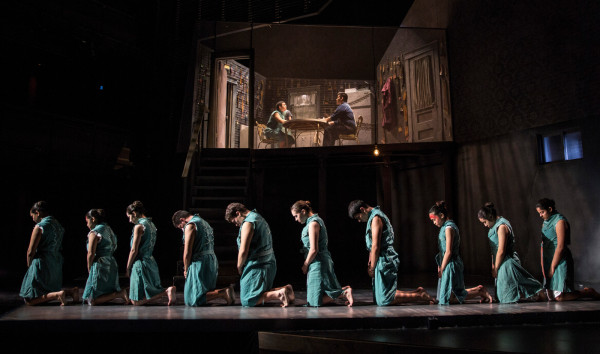Three teenage boys leap, roll off each other’s backs and clap hands in the air as they kill unseen bees, tallying up their respective body counts with shouts of glee.
“Caleb! Three bees.”
“Jeremiah! Two bees.”
“Luke. Four bees!”
Their joy is infectious, but with a dark undertone. These actors are rehearsing “God’s Work” — a devised piece originally created and performed by the youth-oriented, multiethnic Albany Park Theater Project in 2006, and now running in a re-imagined version at the Goodman’s Owen Theatre.
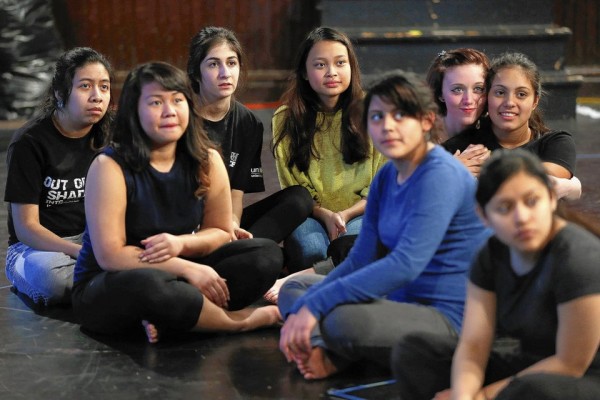
Rehearsal for the Albany Park Theater Project's production of God's Work, at the Eugene Field Park Fieldhouse (John J. Kim/Chicago Tribune)
APTP previously partnered with the Goodman on 2012’s “Home/Land,” 2010’s “Feast” and 2008’s “Aqui Estoy,” all of which transferred from the company’s home at Eugene Field Park, itself named for a 19th-century author of humorous children’s poems (“Wynken, Blynken, and Nod”).
But despite the energetic scene being rehearsed today by co-directors/choreographers Stephanie Paul and Maggie Popadiak, there is little of childlike innocence or whimsy in “God’s Work.” It’s based on the true story of a former APTP member, named Rachel in the play, who grew up one of 18 children in a household dominated by a cruel fundamentalist father before being rescued by a kind aunt and uncle. (It’s not a spoiler to say that “Rachel’s” story ends up well — she finished college and is now married to another former APTP ensemble member.)
So why stage it again? David Feiner, who co-founded APTP in 1997 with his late wife, Laura Wiley, says, “‘God’s Work’ is a seminal piece in the trajectory of the company. Prior to its (2006) production, we had been moving toward a multidisciplinary approach of sound, music, movement, text — but this was really the first time it came together over a full-length production. It always had a special place for me.”
"The key to APTP’s work lies not only in the fact that it is directed by a highly collaborative team of adults...but also in the fact that the performers themselves play a central role in devising the final piece."
It’s also special to the ensemble members who have joined since that initial production and been introduced to the piece on DVD. Kyra Mae Robinson, 16, who is playing Rachel’s mother, notes that she had met the original “Rachel” before the company started work on this new version, when the young woman visited APTP. “I knew about her story. She had come to visit within the first two years I’d been with APTP.” (“Rachel” appeared in the first production of “God’s Work,” though she didn’t play herself.)
Feiner notes of “Rachel” that, “As a storyteller, even at 15, which is when I think we first interviewed her, she had this amazing combination of accessibility, insight, analysis, openness and availability.”
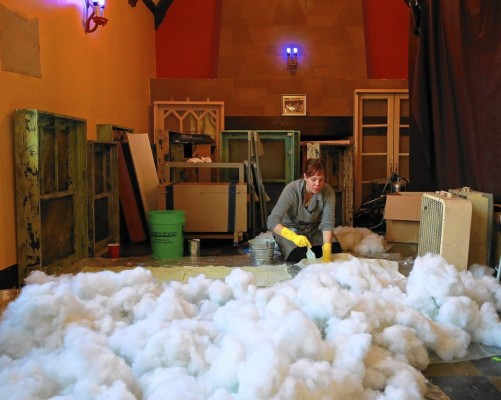
Object Designer Angie Tillges works on set pieces during rehearsal for the Albany Park Theater Project's production of God's Work, at the Eugene Field Park Fieldhouse Wednesday, March 26, 2014, in Chicago. The student cast will perform in April at the Goodman Theatre. (John J. Kim/Chicago Tribune)
The process of reinvention for this production began with watching the DVD of the 2006 performance and reading the nearly 250 pages of transcripts in which “Rachel” recounted her childhood — much of it spent in a basement with her siblings, where they awaited harsh punishments for tiny transgressions. In the play, the physical abuse is embodied through an array of paintbrushes the father uses to “mark” his offspring for their perceived sins, like failure to perfectly recite Bible verses. Seeing the brushes laid out next to a Bible on the prop-room floor at APTP feels like witnessing the tools of the Grand Inquisitor.
However, at the rehearsal for the “Honeybees” segment I witnessed, Paul and Popadiak (the latter is also a former ensemble member) are accentuating the positive — even though the game involves insect carnage. “Pull from the fun and the beauty and joy of ‘Lint,'” Paul urges, referencing an earlier scene in the play in which the children, who never got any toys, make up a game involving balls of lint — embodied here in outsize balls of fluff that also line the prop-room floor next to the paintbrushes.
The key to APTP’s work lies not only in the fact that it is directed by a highly collaborative team of adults (what Paul laughingly calls “hydra direction”), but also in the fact that the performers themselves play a central role in devising the final piece, rather than auditioning for roles and then learning set lines.
“We as artists and the students as ensemble members need the opportunity to infuse our own life into it,” says Paul, who joined APTP’s staff in 2010 and wasn’t involved with “God’s Work” the first time. “We empower the kids to create and to think and to trust in what they have to say and to trust in their instincts. So if we stifle that just to re-create something from the DVD (of 2006’s “God’s Work”), we’re sabotaging ourselves from the get-go.”
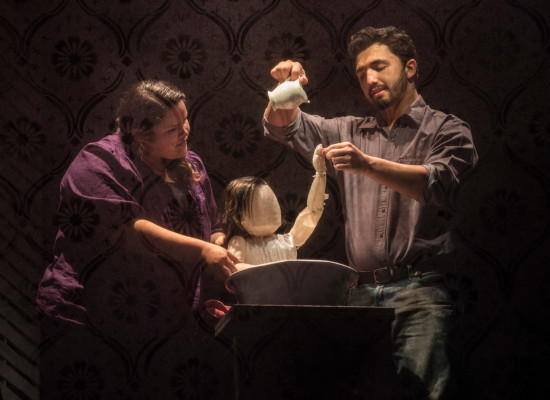
“We empower the kids to create and to think and to trust in what they have to say and to trust in their instincts."
Resident Artist & Movement Director
Maidenwena Alba, 14, who plays Rachel, first joined APTP at the urging of a seventh-grade reading teacher. “I thought they would just give me scripts and I would read off that. And that never happened. Which is so fun, because we just played games and stuff. I was hooked on it ever since.”
Robinson says, “I don’t think of myself as an actress at all. I think we all think of ourselves as storytellers, and I think that makes it so much easier to be able to tell these painful stories on stage.”
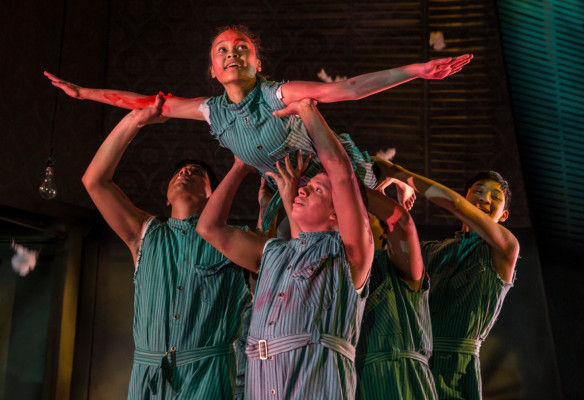
Which is not to say that the ensemble members aren’t working hard at crafting their performances. At the “Honeybees” rehearsal, Paul and Popadiak run the three boys — Abraham Espino as eldest brother Caleb, the “listkeeper” of the kids’ offenses, Justin Martinez as Jeremiah and Gibran Carrisoza as Luke — through their paces over and over, making minute adjustments in timing and physical placement to create the most effective stage pictures. Eventually, the rest of the children join in the game as a kind of controlled chaos spills out on the floor, where tape marks the staircase leading to the parents’ fearsome domain above.
Espino, 15, says the “Honeybees” segment (which, Feiner notes, “came out of a single line” in the original interview transcripts with “Rachel”) is where he “finally connected and learned more about who Caleb is. And I actually felt like he felt. And it was such a great feeling. I’m not just playing a character. You’re invested in the character.”
“I don’t think of myself as an actress at all. I think we all think of ourselves as storytellers."
Ensemble Member
One of the things that has changed from 2006 is the role of Rachel’s mother. “In the original production, she wasn’t exactly portrayed in the kindest light,” says Robinson, adding “I don’t see her as an abuser at all. I see her as the 19th child.” Feiner notes, “We get to see her in action more. In the first production, we just saw her sit there. Now we get to see her make attempts to be a mother.”
For both the directors and the young performers who are bringing “God’s Work” back to life, the overarching theme is what Paul describes as “redemption and love and second chances.”
Says Alba, “The story is so painful, but the fact that at the end it’s just going to turn beautiful — I really want that to stick with the audience.”
“God’s Work” plays through April 19 at the Goodman’s Owen Theatre, 170 N. Dearborn St.; tickets are $10-$25 at 312-443-3800 or goodmantheatre.org
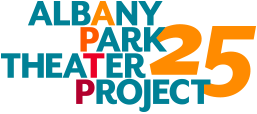 Menu
Menu
